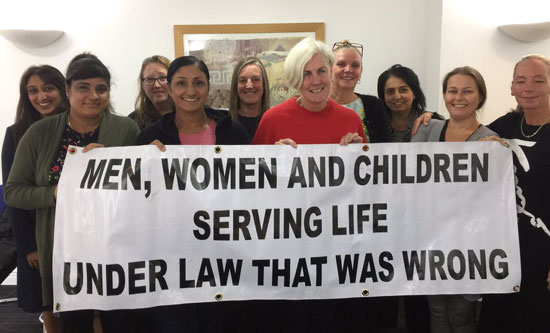
JENGBA organise rallies, supports prisoners and educates people about joint enterprise
On 18 December 2017 comrades from Manchester RCG participated in a lively demonstration by supporters of the Joint Enterprise, Not Guilty By Association campaign (JENGBA). The protest was called to highlight the continuing injustice of joint enterprise convictions. Many JENGBA members are relatives of prisoners convicted under joint enterprise laws.
In February 2016, Supreme Court judges ruled that the law regarding joint enterprise had been ‘wrongly interpreted by judges for 30 years’. This applied especially to the foresight principle, known in legal terms as ‘parasitic accessorial liability’.
Laws on joint enterprise (also often referred to as ‘common purpose’) date back to the 16th century and were used after that time to find those who assisted with staging duels guilty along with those who did the actual killing. In more recent decades, and especially since the 1980s, joint enterprise has been used to ramp up charges against defendants accused of participating in ‘gang violence’. The arrests and trials of such defendants are hyped up by the right wing media and opportunist politicians, to create a panic about dangerous groups of young people.
The dubious legal impact of this was the subject of the film Common, made by radical film producer Jimmy McGovern, which was viewed by 4.4 million people. This fictional work shows police gloating at the fact they can charge people with a violent crime without needing to find out who was directly responsible, just by accusing a gang. McGovern is also patron of JENGBA, which has organised public rallies, supported prisoners in court, produced leaflets to educate people about the issue and lobbied for a parliamentary debate to take place around joint enterprise. This did happen on 25 January, although it remains to be seen whether the points raised by sympathetic MPs actually translate into any changes to the law.
JENGBA’s literature documents many different cases, often relating to very young defendants. A good example is Jordan Cunliffe, who was 15 at the time he was charged and convicted, along with two others, of the murder of Gary Newlove. Jordan was found guilty despite the fact that he was effectively blind at the time, as he suffered from keratoconus, an eye disorder, and could not have foreseen or even watched what was going on. In an interview with The Independent in February 2015, Jordan’s mother Janet Cunliffe said: ‘The prosecution never gave his eye condition any consideration during the trial. They just said because he could kick a football he was capable of killing a man. There was never any credit for his disability.’
Other people convicted under joint enterprise include 22-year-old Bradford woman Laura Mitchell, and her partner Michael Hall, who were involved in a fight over a night-time taxi, but who had no idea that some men also with them had gone to find weapons like knuckle-dusters so they could finish off the eventual victim. The actual killer pleaded guilty to murder but the remaining three defendants were also found guilty after a six-week trial; the case was reported by the Daily Mail as a ‘killing led by a girl’ and carried out by ‘absolute animals’.
Almost every person convicted under joint enterprise is working class and 80% are of black, Asian or minority ethnic origin. This was highlighted by the recent convictions of 11 black men (seven for murder and four for manslaughter) in Manchester on 14 September 2017 over the tragic killing of Abdul Hafidah. As in other joint enterprise cases, there were suggestions of paid police informers being used, sometimes to avoid charges themselves. JENGBA says: ‘The Moss Side joint enterprise convictions were not based on solid physical evidence, but a gang narrative which played out to the same racist tune it always has done.’
Following the Supreme Court victory of February 2016, 13 men, including Michael Hall, appealed against their convictions. JENGBA supporters were angered and dismayed by the verdicts handed down by the appeal court in October 2016 in these cases. In the opinion of top judges led by Lord Chief Justice Thomas, the defendants’ lawyers had failed to prove that a ‘substantial injustice’ had occurred. The sole victory against joint enterprise since the February 2016 judgment has been for Ameen Jogee, whose case was one of the two the Supreme Court itself looked at. Originally convicted of murder, he was retried and convicted of manslaughter; he was subsequently released from prison in July 2017.
As long as joint enterprise continues to be used to round up and imprison working class people, the campaign will continue to have the law scrapped and for its victims to be released and compensated.
Martin Harrison
Fight Racism! Fight Imperialism! 262 February/March 2018




